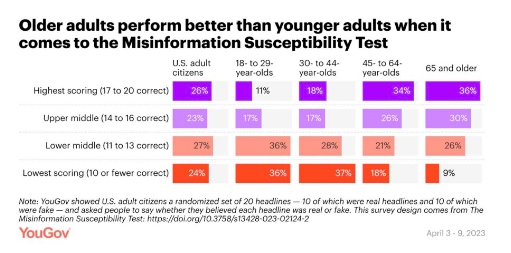Psychologists at the University of Cambridge developed a quiz that seeks to uncover the extent to which people will fall for fake news headlines. Their findings might surprise you – it’s not the older generation that is most susceptible – it’s the ‘very online’ Gen Z and millennials that are most vulnerable to fake news!
- This most recent version of the test, developed with ChatGPT, was sent out by the polling platform YouGov to US citizens and collected 8000 responses. It showed news headlines and asked respondents to either classify them as real or fake.
- On average, adult participants correctly classified two-thirds (65%) of headlines they were shown as either real or fake.
- Surprisingly, defying the stereotypical idea of an online dupe as a technophobic older person, Gen Z and younger millennials were less likely to be able to tell real news from fake news.
- 36% of 18-29-year-olds got a low score, compared to 9% of those 65 or older. Those who spend the most time online recreationally were also more likely to fall victim to misinformation.

- The survey also analysed channels through which people receive news. Those who primarily get their news from legacy media were more likely to perform better on the test, while those who get their news from social media platforms such as Snapchat - popular with younger people - tended to do worse.
- Slightly unsettlingly, the researchers enlisted ChatGPT to write fake but convincing headlines, and it was able to come up with thousands in mere seconds. Experts then cherry-picked the best ones, and different versions of the survey were tested over a two-year period.
You can take the test yourself here – it takes 2 minutes to complete.






